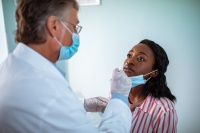BlackDoctor.org
(Black PR Wie) COVID-19 has killed more than 230,000 people in the U.S., and the death toll continues to rise at a rate of about 1,000 per day.
We know, however, that families and communities don’t count their losses in thousands or hundreds; they count them one-by-one – a father, a teacher, a sister, a friend, a nurse, a son, a Tribal elder, a church member. And these losses hurt.
But some communities feel the impact of COVID-19 more than others. Latinos, along with African Americans and American Indians, account for more than half of all COVID-related cases, even though they represent just a third of the population.
According to the Centers for Disease Control and Prevention (CDC), these groups require hospitalization at a rate about five times higher than whites, due to the severity of their illnesses or lack of early access to health care.
And the mortality outcomes reflect this as well: Latinos and American Indians die at 1.5 times the rate of whites, and African Americans, at 2.4 times the rate.
As scientists and NIH colleagues with more than 60 years of combined research experience in health disparities, we are not surprised by these discouraging statistics.
But these awful numbers also feel deeply personal: they represent our friends, our family, our loved ones, too, as our roots are in these very communities—Philadelphia’s African American neighborhoods, Miami’s Cuban immigrant diaspora.
COVID-19, the disease caused by the novel coronavirus SARS-CoV-2, has simply shone a spotlight on health disparities that have long affected underrepresented communities like ours.
We know, for example, that obesity, diabetes, and heart disease are more prevalent among people of color. If you have any of these conditions and contract COVID-19 you run a much higher risk for severe complications and death.
But biology and behavior are just part of the picture. Where we work, whether we have access to quality health care, what we eat, and other socio-economic conditions also drive health disparities.
As we grapple with the effects of these health inequities on our daily lives, we can take simple public health measures to help prevent the immediate spread of this disease, starting with wearing a mask, washing our hands, and maintaining six feet of distance from others. But that won’t be enough to end the pandemic in communities of color.
As the leaders of two public health research agencies, we know we can’t just devise solutions from Washington, D.C. We must also work with those who are most trusted, respected, and closest to these hard-hit communities.
Through joint local efforts, we believe we can ensure that the best, most accurate information reaches these communities, and that they are informed about, and included in, diverse research studies essential for developing safe, effective treatments, and vaccines for all.
# # #

